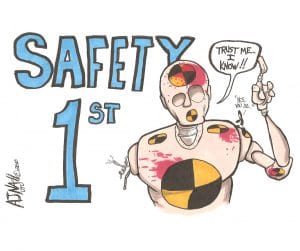FRA SAFETY BULLETIN 2023-02
SUBJECT: Highway-Rail Grade Crossing and Shove Movement Accident
The Federal Railroad Administration (FRA) is investigating a recent switching accident that resulted in a crew member fatality.
Based on FRA’s preliminary investigation, a conductor with 18 years of service was fatally injured when the tank car he was riding to provide point protection for a switching move was struck by a dump truck. The incident occurred at a private grade crossing in a steel plant as the train consist traveled southward.
The dump truck, traveling west, stopped at the private highway-rail grade crossing, then proceeded and collided with the car the conductor was riding, killing the conductor. It was nighttime, the yard was lighted, and the conductor had his lantern turned on.
Prior to the incident, the conductor was in communication with the engineer via radio. The private highway-rail grade crossing was equipped with passive warning devices and stop signs.
The purpose of this Safety Bulletin, which is informal in nature, is to ensure the railroad industry, including railroad employees, are aware of this recent accident that resulted in a fatality of an employee. As FRA completes its investigation, it may take additional actions with respect to this accident.
Although FRA’s investigation into this accident is ongoing, FRA notes the importance of ensuring pushing or shoving movements over highway-rail crossings are conducted safely, to include:
- Proper training, periodic oversight, and application of appropriate railroad operating rules when determining whether the track is clear, and
- Proper job briefings and communications between assigned crewmembers during pushing or shoving movements.
FRA requests that railroads review this Safety Bulletin with employees to increase awareness of the dangers of pushing and shoving movements at highway-rail grade crossings. FRA also
reminds railroads of the need to ensure all individuals involved in pushing or shoving movements are: (1) properly trained and qualified on how to conduct those operations safely;
and (2) understand what “track is clear” means related to a highway-rail grade crossing.
Additionally, FRA reminds railroads and train crew members of the work of the Switching Operations Fatality Analysis (SOFA) Working Group, a voluntary, non-regulatory, workplace safety partnership formed to identify commonalities among fatalities that occur during switching operations. SOFA findings are available on FRA’s website.
 Job briefings can prevent serious injuries and fatalities, says the Federal Railroad Administration in a switching fatalities and severe injury update. The FRA cites 23 fatalities that have occurred as a result of what it terms “inadequate job briefings.”
Job briefings can prevent serious injuries and fatalities, says the Federal Railroad Administration in a switching fatalities and severe injury update. The FRA cites 23 fatalities that have occurred as a result of what it terms “inadequate job briefings.”